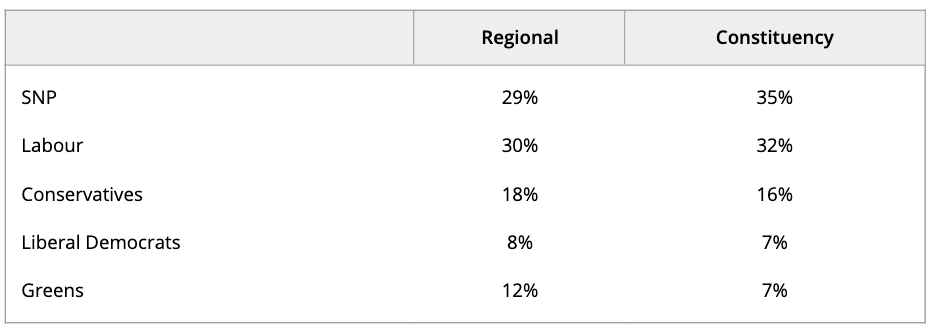| 7 mins read
Scottish Labour, in partnership with a resurgent UK Labour, appears confident and unified under Anas Sarwar. Nicola Sturgeon's successor, Humza Yousaf, appears vulnerable to challenge after a bruising leadership contest and allegations of financial misconduct within the SNP, whilst the Scottish Conservatives seem tainted by the unpopularity of the government at Westminster. Labour's decisive victory in the Rutherglen and Hamilton West by-election in October 2023 suggests the possibility of a Labour comeback, with important implications for the party's ability to form a government at the next UK general election.
Analyses of Scottish Labour in recent years have focussed on a party stuck in the middle—between the ardent, and assertive unionism of the Conservatives and the nationalism of the SNP. This left the party squeezed electorally. But the collapse of the Conservatives may mean that tactical voting in Scotland may now favour Labour.
Is Labour's rise a result of the party's strength, or the weaknesses of its political rivals? How might Labour answer the independence question that has divided Scottish politics? And might success serve to highlight ideological/policy differences between the Scottish and UK parties?
Labour, Scotland and constitutional politics
Early 2023 saw a prolonged and decisive shift in polling for both UK and Scottish Labour. Public perceptions of the SNP's competence in government have declined, with net negative scores across a range of policy areas, including education, the NHS, economic management and living standards. The same polling from Ipsos MORI suggested that when asked about a Scottish Labour government, voters were marginally more positive, albeit with net negative scores, suggesting a general pessimism about the state of politics.
At the time of writing, Labour has advanced in the polls in Scotland. The SNP still leads both Westminster and Holyrood vote intentions (Table 1), but with far less comfortable margins than seen even six months earlier.

Table 1. Scottish voting intentions, UK general election (Source: YouGov and The Times polling, fieldwork 8–13 September 2023)
Eight SNP MPs have announced that they will not stand in the next general election, creating additional opportunities for Labour to challenge the SNP's hegemony in Scottish seats.
Recent polling suggests that at Holyrood the gap in voting intentions has narrowed further, with a Panelbase poll conducted for the Sunday Times (Table 2) suggesting a very narrow lead for the SNP.

Table 2. Scottish Parliament voting intentions (Source: Panelbase poll for the Sunday Times, fieldwork 2–5 October 2023)
While perceptions of all the main party leaders remain negative, Anas Sarwar's net approval rating (-8) is stronger than those of his rivals. Scottish Labour's strategy consists of three core arguments. The first asserts that the SNP and Conservative obsession with independence has obscured the fact that people's real concern is on policies which effect their everyday lives. Policy failures at the Scottish and UK level are therefore ignored by both parties amidst constitutional wrangling and internal party turmoil.
This contributes to the second plank, an appeal to those who have abandoned the party in recent years to return to the Labour Party, their natural home. In return, the party promises a fresh offering and readiness for government.
The final plank is centred on constitutional reform, showcasing the party's proposals for a radical reorganising of the UK's institutions and structures.
Scottish Labour's leadership painted a grim picture of the post-pandemic UK, arguing that only Labour, free from the entanglements of constitutional debates, could address these problems. Sarwar has said ‘People's bills are going up, whether they voted yes or no,’ and ‘Nicola Sturgeon is a division politician, I am a unity politician.’ Without a clear route to another referendum, Labour's demand to focus on more pressing policy issues may have greater resonance.
Labour as a ‘credible alternative’
The nature of Labour's decline in recent elections makes a universal argument challenging. To regain lost voters the party must make a simultaneous appeal to those supportive of independence and those who left Labour in search of a more ardently unionist party.
Labour figures argue that independence would only lead to accelerated austerity as an independent Scotland attempted to balance the books. Polling suggests a decoupling of support for the SNP and for independence. This enables Scottish Labour to make an appeal to those generally supportive of Scottish independence, but who prioritise other policies in the near to medium term.
Divides are already evident between the party in Edinburgh and in London, particularly over gender recognition reform and the two-child benefit cap. We can expect SNP campaigners to make political capital out of policy differences and any cuts to spending which may enacted.
A new era for Scottish Labour?
In Scotland, Labour now sits comfortably in second place in the polls, appearing more effective as a party of opposition than its Conservative rival.
SNP's support has remained surprisingly stable in the face of scandal. Labour’s standard answer to the independence question is to stress policy rather than the constitution. But this has not, as yet, satisfied Scottish voters. Starmer has said that he would not support a referendum in the first term of a Labour government, and politicians in both London and Edinburgh have sought to swerve the issue.
if Labour wins at Westminster, it is likely to inherit a challenging economic situation. For many, it is unclear what exactly a Labour government at Holyrood would do differently. The party is once again seeking a middle road in its pursuit of power, while its political rivals turn their focus inward. However, this middle way remains challenging.
Need help using Wiley? Click here for help using Wiley







